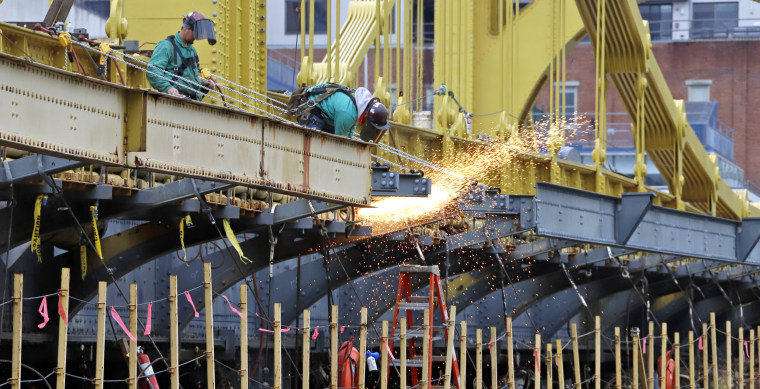Before the Democrats' COVID relief package was even finished, President Joe Biden and his allies were already looking ahead to the next major challenge: a jobs and infrastructure package. Would Dems be equally ambitious with this next big part of their agenda?
We didn't have to wait too long for an answer. The White House's infrastructure blueprint -- known as the "Build Back Better Recovery Plan" -- is a sweeping $3 trillion package that would invest in all kinds of priorities, from infrastructure to climate, education to rural broadband, electrical grids to 5G telecommunications.
There's no shortage of questions about the road ahead, but let's start with the one that tends to dominate Capitol Hill thinking in 2021: What does Joe Manchin think? As NBC News reported yesterday, the conservative West Virginia Democrat appears to be an enthusiastic proponent of the idea.
Sen. Joe Manchin said Wednesday that he favors a large infrastructure package that would be paid for in part by raising tax revenues — a point of contention between the two parties. "I'm sure of one thing: It's going to be enormous," the West Virginia Democrat, who is seen as a swing vote in a chamber divided 50-50, told reporters at the Capitol.
The second question is more practical: Should the plan be paid for, and if so, how? On this front, there appears to be broad agreement among Democrats that at least some of the infrastructure plan should be paid for, and to that end, the party is eyeing significant rollbacks to Donald Trump's 2017 regressive tax package. At the top of the list is an increase to the corporate tax rate, which Republicans slashed four years ago.
Manchin, incidentally, is on board with this approach, too.
And finally, there's the tactical question: How would such a package pass? As regular readers know, Democrats can use the budget reconciliation process to circumvent a filibuster twice this year. They used it once to pass the American Rescue Plan, and party leaders have long planned to use it again to approve an infrastructure plan.
It's at this point that the larger strategic story gets a little complicated. The White House initially envisioned a two-part process: one for a bipartisan bill filled with popular measures that enjoy broad support, and then another with more progressive and ambitious goals that would never receive GOP backing.
Reconciliation would be used for the latter, and it wouldn't be necessary for the former.
Republicans have already said they have no intention of cooperating with such an approach. "It's a pretty cynical ploy to try and appeal to Republicans to vote for all that stuff, and then do reconciliation to do all the other hard stuff," Senate Minority Whip John Thune (R-S.D.) told reporters this week.
Indeed, the idea that infrastructure could be the one issue on which the major parties found common ground is quickly evaporating. The Republican position is that the Democratic plan is too big, shouldn't be divided into parts, and can't be paid for through significant tax increases on big corporations and the wealthy.
For Manchin, who has repeatedly said he want this to be a bipartisan effort, the GOP's approach is tough to defend.
Notably, Manchin said the Republican resistance to higher taxes was not a "reasonable" position in an infrastructure negotiation. "Where do they think it's going to come from?" he asked. "How are you going to fix America?"
To be sure, the process is just getting underway in earnest, and it's likely to experience plenty of twists and turns. But at this point, GOP senators are effectively telling Democrats that if they want to pursue an ambitious infrastructure plan, they shouldn't look to Republicans to play a constructive role in the process.
The result is a dynamic in which the budget reconciliation process will almost certainly be necessary. Manchin and Sen. Bob Casey (D-Pa.) have previously said they don't want to use the tactic on an infrastructure bill, but as things stand, GOP senators don't intend to give Democrats much of a choice.

